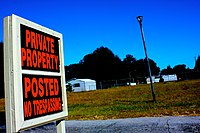Tag:access=private
| Description |
|---|
| The feature is not to be used by the general public. |
| Group: restrictions |
| Used on these elements |
| Useful combination |
| See also |
| Status: de facto |
| Tools for this tag |
|
The access=private tag is indicating that the object is not to be used by the general public. Access is only with permission on an individual basis.
Use private=* to clarify who exactly is allowed to use a facility (or a way) with private access.
Road usage
Common use is for objects with restricted access, such as roads where only some may drive. For example, adding access=private marks a driveway (tagged as highway=service + service=driveway) as restricted – for example because it is behind a gate.
Routing programs are able to detect this tag, and know to avoid these roads when routing.
See access=* for an overview of access tagging and also UK public rights of way for the legal situation in the United Kingdom.
Facilities
The value indicates that access is allowed only for a closed group of users, such as employees of a company, members of an association or club, or individuals. Use private=* to clarify which group is allowed to access the facility.
Examples for the access=private tag include:
- amenity=parking + access=private – for private parking, such as company employees
- leisure=swimming_pool + access=private – for a swimming pool in a private backyard.
- leisure=playground + access=private – for a playground in a school or kindergarten.
Clarification of the term “private”
Note that access=private is intended to indicate that access is restricted, not whether the object is privately owned or not. Use ownership=private or operator:type=private to record this kind of status. For example, a privately owned road with public access may be tagged like any other road with public access – without access=* tag, or with the explicit access=permissive.
Unfortunately as of 2023 access=private is widely used as a duplicate of access=permissive as well as ownership=private and should not be expected to match the originally intended meaning.
Examples:
Relation to access=no
Sometimes access=no is described as a stronger version of access=private. For example, a stretch of roadway may be closed with a “Road Closed” sign and barricades due to serious damage to a road or a long-term construction project. There may be a physical reason why no one would realistically be able to traverse the road. If applicable, also map any barriers that prevent anyone from entering or traversing the road.
Note: Long term construction projects are often mapped by retagging such roads to highway=construction + construction=*.
Controversy
Some people use access=private for situations where no explicit permission is required to access, but currently there is no consensus around this one way or the other. For example, delivery of post and packages.
Rendering
 at osm-carto
at osm-carto
See also
- access=no – The object is prohibited to be used by the general public.
- access=destination – Non-transit traffic/access to a given element is allowed.


